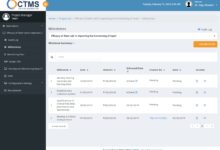Hospital CRM Software Systems: 7 Powerful Benefits You Can’t Ignore
In today’s fast-evolving healthcare landscape, hospital CRM software systems are no longer a luxury—they’re a necessity. These powerful tools streamline patient engagement, boost operational efficiency, and transform how hospitals manage relationships. Let’s dive into why they’re revolutionizing modern healthcare.
What Are Hospital CRM Software Systems?

Hospital CRM (Customer Relationship Management) software systems are specialized digital platforms designed to help healthcare providers manage interactions with patients, streamline communication, and improve service delivery. Unlike traditional CRMs used in retail or finance, hospital CRM software systems are tailored to meet the unique demands of medical environments—including patient confidentiality, appointment scheduling, medical history tracking, and compliance with healthcare regulations like HIPAA.
Core Functions of Hospital CRM Systems
At their core, hospital CRM software systems focus on enhancing patient experience and optimizing internal workflows. Key functions include:
- Patient data management and centralized records
- Automated appointment reminders and follow-ups
- Multi-channel communication (email, SMS, phone, chat)
- Patient feedback collection and satisfaction surveys
- Integration with Electronic Health Records (EHR) and billing systems
These functions allow hospitals to move from reactive to proactive care models, ensuring patients feel valued and informed throughout their healthcare journey.
How Hospital CRM Differs from General CRM
While general CRM platforms like Salesforce or HubSpot are built for sales and marketing, hospital CRM software systems are purpose-built for healthcare. They prioritize patient privacy, clinical workflows, and regulatory compliance. For instance, a hospital CRM must support audit trails, role-based access control, and secure data encryption—features that are less critical in non-medical CRMs.
“Healthcare CRM isn’t about selling products—it’s about building trust, ensuring continuity of care, and improving health outcomes.” — Dr. Lisa Chen, Healthcare Technology Analyst
Additionally, hospital CRM systems often integrate with clinical decision support tools, telemedicine platforms, and patient portals, making them an essential part of a hospital’s digital ecosystem.
Why Hospitals Need CRM Software Systems
The shift toward patient-centered care has made CRM adoption essential. Patients today expect the same level of service they receive from retail or banking sectors—personalized, timely, and seamless. Hospital CRM software systems bridge the gap between clinical excellence and patient satisfaction.
Rising Patient Expectations
Modern patients are more informed and demanding. They want easy access to appointments, transparent communication, and personalized care plans. A 2023 study by Healthcare Dive found that 78% of patients are more likely to return to a hospital that offers digital engagement tools like automated reminders and online portals.
Hospital CRM software systems meet these expectations by enabling:
- Self-service appointment booking
- Real-time updates on wait times and test results
- Personalized health tips based on medical history
This level of service not only improves satisfaction but also reduces no-show rates and administrative burden.
Operational Efficiency and Cost Reduction
Manual processes like phone-based follow-ups and paper-based feedback forms are time-consuming and error-prone. Hospital CRM software systems automate these tasks, freeing up staff to focus on patient care rather than administrative work.
For example, automated SMS reminders can reduce no-shows by up to 30%, according to research published by the National Center for Biotechnology Information. This directly translates to better resource utilization and increased revenue.
Key Features of Modern Hospital CRM Software Systems
Today’s hospital CRM software systems go beyond basic contact management. They are intelligent, integrated, and designed to support the full patient lifecycle—from first contact to long-term wellness management.
Patient Engagement Tools
Engagement is at the heart of any CRM. Hospital CRM software systems offer tools like:
- Automated birthday and wellness messages
- Post-discharge follow-up workflows
- Chronic disease management programs with scheduled check-ins
- Interactive patient portals for secure messaging
These tools keep patients connected and informed, which is especially crucial for managing conditions like diabetes or hypertension.
Analytics and Reporting Capabilities
Data-driven decision-making is critical in healthcare. Hospital CRM software systems provide real-time dashboards and reports on key metrics such as:
- Patient satisfaction scores
- Appointment adherence rates
- Marketing campaign effectiveness
- Patient retention and churn analysis
These insights help hospital administrators identify trends, allocate resources effectively, and improve service quality.
Integration with EHR and Other Systems
One of the biggest challenges in healthcare IT is data silos. Hospital CRM software systems solve this by integrating seamlessly with Electronic Health Records (EHR), billing systems, and telehealth platforms.
For instance, when a patient books an appointment through the CRM, the system can automatically update the EHR, notify the physician, and trigger insurance verification—all in real time. This interoperability ensures data consistency and reduces administrative errors.
Top Benefits of Implementing Hospital CRM Software Systems
The advantages of adopting hospital CRM software systems extend across clinical, operational, and financial domains. Let’s explore the seven most impactful benefits.
Improved Patient Satisfaction
When patients feel heard and supported, their satisfaction soars. Hospital CRM software systems enable personalized communication, timely responses, and consistent follow-ups. A study by JMIR Medical Informatics showed that hospitals using CRM tools reported a 40% increase in patient satisfaction scores within six months of implementation.
Features like automated feedback requests and sentiment analysis allow hospitals to identify and address concerns before they escalate.
Enhanced Patient Retention
Acquiring a new patient can cost five times more than retaining an existing one. Hospital CRM software systems help build loyalty through ongoing engagement. For example, a patient who receives regular health tips, vaccination reminders, and check-up prompts is more likely to return for care.
CRM systems also segment patients based on risk factors, treatment history, or demographics, enabling targeted outreach campaigns that improve retention rates.
Streamlined Communication Across Departments
In large hospitals, miscommunication between departments can lead to delays and errors. Hospital CRM software systems act as a central communication hub, ensuring that everyone—from front desk staff to specialists—has access to the same patient information.
For example, when a patient calls with a billing question, the CRM can display their recent visits, insurance details, and previous interactions, enabling faster resolution.
How Hospital CRM Software Systems Improve Care Coordination
Effective care coordination is essential for managing complex cases, especially for elderly patients or those with chronic conditions. Hospital CRM software systems play a pivotal role in synchronizing care across multiple providers and settings.
Centralized Patient Information
One of the biggest challenges in care coordination is fragmented data. Hospital CRM software systems consolidate patient data from various sources—appointments, lab results, prescriptions, and communication logs—into a single, accessible profile.
This 360-degree view allows care teams to make informed decisions quickly. For example, a primary care physician can see that a patient recently visited a specialist and received new medication, avoiding potential drug interactions.
Automated Care Pathways
CRMs can be programmed with clinical pathways for common conditions like heart disease or asthma. When a patient is diagnosed, the system automatically triggers a series of actions: scheduling follow-up visits, sending educational materials, and assigning care managers.
This standardization reduces variability in care and ensures that no step is missed, improving outcomes and reducing readmissions.
Support for Remote Patient Monitoring
With the rise of telehealth, hospital CRM software systems now integrate with wearable devices and remote monitoring tools. Vital signs like blood pressure, glucose levels, or heart rate can be fed directly into the CRM, triggering alerts if values fall outside normal ranges.
This proactive approach allows early intervention, preventing complications and hospitalizations.
Selecting the Right Hospital CRM Software System
Not all CRM systems are created equal. Choosing the right one requires careful evaluation of features, scalability, security, and vendor support.
Key Evaluation Criteria
When assessing hospital CRM software systems, consider the following factors:
- Compliance: Ensure the system meets HIPAA, GDPR, or other relevant regulations.
- Customization: Can workflows be tailored to your hospital’s specific processes?
- Scalability: Will the system grow with your organization?
- User Experience: Is the interface intuitive for both staff and patients?
- Vendor Reputation: Look for providers with proven healthcare experience.
Popular vendors include Epic MyChart, Salesforce Health Cloud, and NextGen Healthcare—all offering robust hospital CRM software systems with strong integration capabilities.
Implementation Best Practices
Successful CRM implementation requires more than just software installation. Follow these best practices:
- Start with a pilot program in one department
- Train staff thoroughly and provide ongoing support
- Involve clinicians in the design process
- Monitor KPIs and adjust workflows as needed
A phased rollout reduces resistance and ensures smoother adoption.
Future Trends in Hospital CRM Software Systems
The future of hospital CRM software systems is shaped by emerging technologies like artificial intelligence, predictive analytics, and patient empowerment.
AI-Powered Patient Interaction
AI chatbots and virtual assistants are becoming common in hospital CRM software systems. They handle routine inquiries—like appointment changes or prescription refills—24/7, reducing call center volume.
Advanced systems use natural language processing to understand patient sentiment and escalate urgent issues to human staff.
Predictive Analytics for Proactive Care
By analyzing historical data, hospital CRM software systems can predict which patients are at risk of readmission, non-compliance, or disease progression. This allows hospitals to intervene early with targeted outreach or care plans.
For example, a patient with a history of missing appointments might receive extra reminders or be assigned a care coordinator.
Greater Patient Control and Self-Service
Future CRM systems will give patients more control over their health data and interactions. Features like AI-driven health coaches, personalized treatment plans, and blockchain-secured records are on the horizon.
Patients will be able to manage their entire healthcare journey through a single, secure portal—accessible from any device.
Challenges and Considerations in CRM Adoption
Despite their benefits, hospital CRM software systems come with challenges that must be addressed to ensure success.
Data Privacy and Security Risks
Storing sensitive patient data in a CRM increases the risk of breaches. Hospitals must ensure that their CRM provider uses end-to-end encryption, regular security audits, and compliance certifications.
Staff training on data handling and access controls is equally important to prevent internal leaks.
Resistance to Change
Clinical staff may resist adopting new technology, especially if it adds to their workload. To overcome this, involve end-users early, demonstrate clear benefits, and provide continuous training.
Highlight how CRM reduces repetitive tasks—like calling patients for follow-ups—freeing up time for patient care.
Integration Complexity
Integrating CRM with legacy systems can be technically challenging. Choose vendors that offer APIs, pre-built connectors, and dedicated support teams to ease the transition.
Conduct thorough testing before full deployment to avoid disruptions in care delivery.
What are hospital CRM software systems?
Hospital CRM software systems are digital platforms designed to manage patient interactions, streamline communication, and improve care coordination. They integrate with EHRs, automate workflows, and enhance patient engagement through personalized outreach and analytics.
How do hospital CRM systems improve patient satisfaction?
They improve satisfaction by enabling timely communication, automated reminders, personalized care plans, and easy access to services. Patients feel more valued and supported, leading to higher loyalty and better outcomes.
Are hospital CRM systems HIPAA-compliant?
Reputable hospital CRM software systems are designed to meet HIPAA requirements, including data encryption, access controls, and audit trails. Always verify compliance before implementation.
Can CRM systems reduce hospital no-show rates?
Yes. Automated SMS and email reminders have been shown to reduce no-show rates by up to 30%, improving resource utilization and revenue.
What is the cost of implementing a hospital CRM system?
Costs vary based on size, features, and vendor. Small clinics may pay $50–$150 per user/month, while large hospitals may invest $100,000+ for enterprise solutions. Implementation and training add to initial costs.
Hospital CRM software systems are transforming healthcare by putting patients at the center of care. From improving satisfaction and retention to enabling data-driven decisions and seamless coordination, these systems are essential for modern hospitals. While challenges like integration and change management exist, the long-term benefits far outweigh the costs. As technology evolves, CRM systems will become even more intelligent, predictive, and patient-empowering. The future of healthcare isn’t just about treating illness—it’s about building lasting relationships, and hospital CRM software systems are leading the way.
Further Reading:

